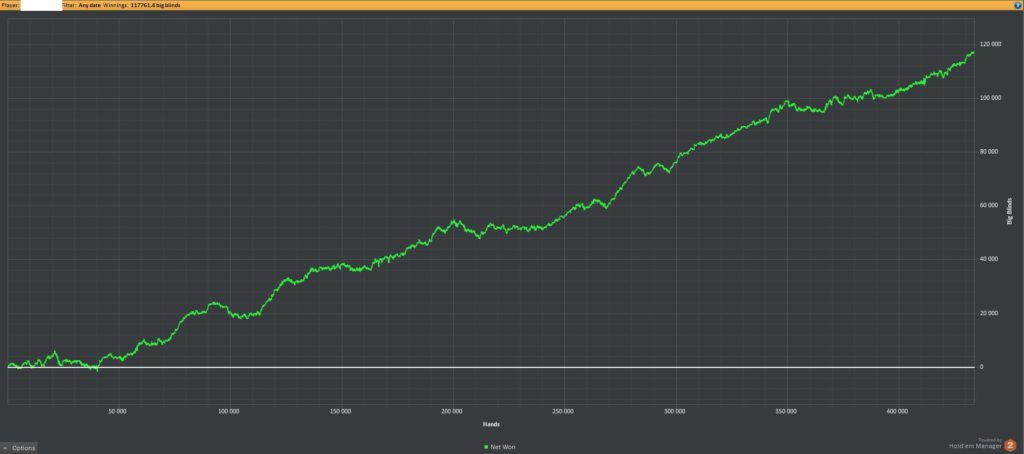Why You Should Never Use Absolutes in Investing
If there is anything that is certain in investing, and pretty much most things in life, it is that nothing is certain. When I see people using absolutes while at least indirectly making a case for or against an investment you know from the start that the writer probably is not a good investor. Using absolutes is lazy investing and short circuits the whole investing process from the get go. It’s like throwing up your hands and declaring that it definitely IS or is NOT investment worthy.
Why?
Because I as an investor/speculator am considering what the expected probabilities of certain outcomes might be and what would happen if certain outcomes materialize. Using absolutes is akin to folding your hand in the Big Blind just because you have 2-7 off suite, after someone limped from the “UTG” position, since you can be sure you have the worst hand. The reason this is such a big mistake is because you’re not even paying to see the flop. You are not taking on any additional monetary risk than what was already forced upon you. Once in a blue moon the flop will come 222 or 777 etc and if the UTG limper had AA you can probably make a good buck.
This is where the concept of “pot odds” comes in…What does it cost me? What am I risking? What is the probability I will have the best hand? What will I gain if I end up having the best hand?
There were a lot of times in poker playing days that I knew I had the worst hand but had to play it due to positive Expected Value. Exploiting very human flaws/psychology and math is what poker is all about and it was not the use of absolutes (black and white) which resulted in this graph:
My Profit/Loss graph over ~450K hands of PLO
… It was mainly due to having a better grasp on probabilities, appreciation for risk adjusted Expected Value and discipline. Not stuff like “Oh I have AAxx so I guess I’ll go all in no matter what happens”.
Am I surprised that quite a few successful hedge fund managers are good poker players as well? No… Estimating probabilities, risk and reward is their bread and butter… Not investing based on “This will 100% for sure not happen” or vice versa.
There are a lot of very vocal people in this sector but there are few that I consider good investors. On that note I think the best investors on twitter are people who are NOT geos or mining engineers. Mining and mining investing are two totally different skill sets even though few seem to be aware of that fact. Food for thought.
It’s all about trying to appreciate the Risk/Reward. Using absolutes is like folding or going all in no matter what the cost (risk) and potential return (reward) is. It makes no rational sense and is totally the wrong way to go about things in an extremely uncertain world. There are micro cap juniors out there that I would never touch (on semi irrational principle), but at the same time, would never short…
Why?
Because there are too many moving parts and I can never be 100% sure that scenario X will happen and not scenario Y. This is also why most of the most successful short sellers tend to not place their bets and try to pick the top but rather go big when bankruptcy is all but certain (at much lower levels). Just consider how many shorts have been devastated by trying to short Tesla even though they were “dead sure” in regards to imminent collapse.
I can only make an investment case when I think I have a pretty good idea of what is priced in and what is not priced in. I prefer not to pay for the upside scenarios since it means I am not taking on that risk. When I see a lot of people throwing absolutes around, like in the case of Novo Resources recently, I just shake my head. The reason is simple; There is no way in hell that they can be absolutely 100% sure that they are right. So if you use absolutes that is another way of saying “I won’t even consider a world where I am wrong and I will not synthesize a story into a real investment case”. It’s like the most irrational form of a motivated seller…
Think about it. If there is a large number of people who will not even consider what the price versus value or risk/reward is then they would be sellers at any price, no matter how good or bad the opportunity is. Selling at any price is just the flip side of buying at any price(!). Latching onto an idea, then forming a “dead sure” opinion, about things that are impossible to be dead sure about sets you up for fail.
Am I surprised to see the Novo naysayers get it wrong a lot such as “There is no potential value outside Beaton’s Creek”? No.
Why? Because they use absolutes to confirm their bias which is a huge mistake from the get go. They didn’t even entertain the idea of being wrong given the wording used. Stuff like this is what I try to capitalize on. Flawed thinking. Make no mistake, I’m biased as well but you won’t see me using many absolutes, even though I have written hundreds of pages on Novo. I consider what is priced in and what is not. Am I absolutely sure that Novo will be a major producer within 10 years? No. Is it priced like it will be? No, so it’s somewhat of a moot point.
If the market does not price in anything for a given asset or assets it is akin to the market using absolutes and saying “there is a zero percent chance that this has any value”. How often is there a zero percent chance of anything? Well, escaping death and taxes perhaps, but that’s about it. To take this into an extreme example; It is like giving a potential buyer a gift of a lottery ticker free of charge. If it ends up being worthless the buyer loses nothing. If it ends up being worth something the buyer will theoretically have gained a risk free return. I’ll buy an unlimited amount of lottery tickets if it costs me nothing. Regardless of the chance of winning or how big or small the prize might be. The flip side of this is buying something where everything that could possibly go right is already priced in which means taking on 100% of the risk with 0% upside potential.
The Heart of The Matter
If I am up against market participants that use absolutes then I know a) They don’t really know what investing/speculation is all about and b) They are likely to miss opportunities to buy at the bottom and sell at the top.
If the consensus suggests that there is 0% chance of scenario A-Z happening and you think there is at least a 5% chance then you might theoretically looking at potential “risk free” returns. In the case of Novo I see some who says it’s “too good to be true” and then throw up their hands. My response would be so what? Nothing even close is priced in so I’m not even paying for it. If Novo were to become “even” a 200Koz high margin producer I will get a good return. If it turns out to be much bigger than that, well then I will get a much better return. The idea of “I don’t think the blue sky will materialize so I won’t invest at any price” is totally stupid for the lack of a better word. The question is what is priced in and what is not priced in coupled with probabilities. Being a lazy investor is why the majority will not beat an index over the long term so stop being a lazy “absolutes user!”. Do the damn work.
My main goal is to look for opportunities that looks to include “risk free” return potential. The chances of finding it is of course higher when there are “investors” around who include a lot of absolutes when making investment decisions (The ones who let a single opinion about an unknowable future totally dictate their decision).
If you see me using absolutes in regards to future outcomes then slap me. If you see people using absolutes in regards to future outcomes then stop reading because they have no clue what investing/speculation really is.
Closing Thoughts
Compare the wording from the ex De Beers Manager:
” I am expecting them to have a few teething problems, which will test their ingenuity and tenacity. It must be getting very hot in the Pilbara, which will also be a severe test for personnel there. But I remain confident that they will overcome any obstacles with panache. That is their style. “
with this from the Crux piece:
“At its most basic, the Company is built on sand with most of the Pilbara portfolio acreage being worthless”
… I know who I would want to play poker and invest against between these two. The former sees challenges, believes they will be overcome, and probably lead to some good returns. The latter is using an absolute and has already formed conclusions about the universal prospectivity over 14,000 km2 which is literally impossible to know. In other words the latter is fooling himself into believing he has the answer to a question which is impossible to answer and will be making his investment decisions based on misplaced arrogance.
If you can’t spot the fish at the table then YOU are the fish.
(Note: This is not a buy or sell recommendation. This is not investment advice and I am not a geologist. This article is highly speculative, forward looking and I can’t guarantee accuracy. Always do your own due diligence. I own a lot of shares of Novo Resources which I have bought in the open market and am thus biased. Novo is a passive banner sponsor on my site. )
Best regards,
The Hedgeless Horseman
Follow me on twitter: https://twitter.com/Comm_Invest
Follow me on CEO.ca: https://ceo.ca/@hhorseman





























Excellent Article,
Thanks Jim!
Best regards
Great insights- don’t know what UTG means but I get the idea. TY
Eskay looks good here as well.
Glad you liked it Jonathan. UTG means “Under The Gun” and is the most disadvantageous position you can be in. You act before everyone else pre and post flop so you don’t get the benefit of seeing what others will do before you. In other words people only tend to play really strong hands in that position.
Best regards